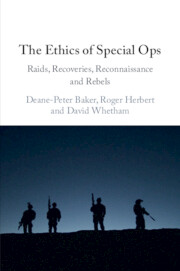Refine search
Actions for selected content:
9 results
Chapter 2 - Raids
-
- Book:
- The Ethics of Special Ops
- Published online:
- 16 November 2023
- Print publication:
- 30 November 2023, pp 30-52
-
- Chapter
- Export citation
Chapter 1 - Introduction
-
- Book:
- The Ethics of Special Ops
- Published online:
- 16 November 2023
- Print publication:
- 30 November 2023, pp 1-29
-
- Chapter
- Export citation
Chapter 5 - Rebels
-
- Book:
- The Ethics of Special Ops
- Published online:
- 16 November 2023
- Print publication:
- 30 November 2023, pp 118-142
-
- Chapter
- Export citation
Chapter 7 - Ethical Armouring for Special Operations Forces
-
- Book:
- The Ethics of Special Ops
- Published online:
- 16 November 2023
- Print publication:
- 30 November 2023, pp 178-217
-
- Chapter
- Export citation
Chapter 3 - Recoveries
-
- Book:
- The Ethics of Special Ops
- Published online:
- 16 November 2023
- Print publication:
- 30 November 2023, pp 53-79
-
- Chapter
- Export citation
Chapter 4 - Reconnaissance
-
- Book:
- The Ethics of Special Ops
- Published online:
- 16 November 2023
- Print publication:
- 30 November 2023, pp 80-117
-
- Chapter
- Export citation
Chapter 6 - Not Quite War
-
- Book:
- The Ethics of Special Ops
- Published online:
- 16 November 2023
- Print publication:
- 30 November 2023, pp 143-177
-
- Chapter
- Export citation

The Ethics of Special Ops
- Raids, Recoveries, Reconnaissance, and Rebels
-
- Published online:
- 16 November 2023
- Print publication:
- 30 November 2023
6 - America’s Small-Footprint Wars
-
- Book:
- America's Wars
- Published online:
- 16 December 2021
- Print publication:
- 20 January 2022, pp 176-213
-
- Chapter
- Export citation
